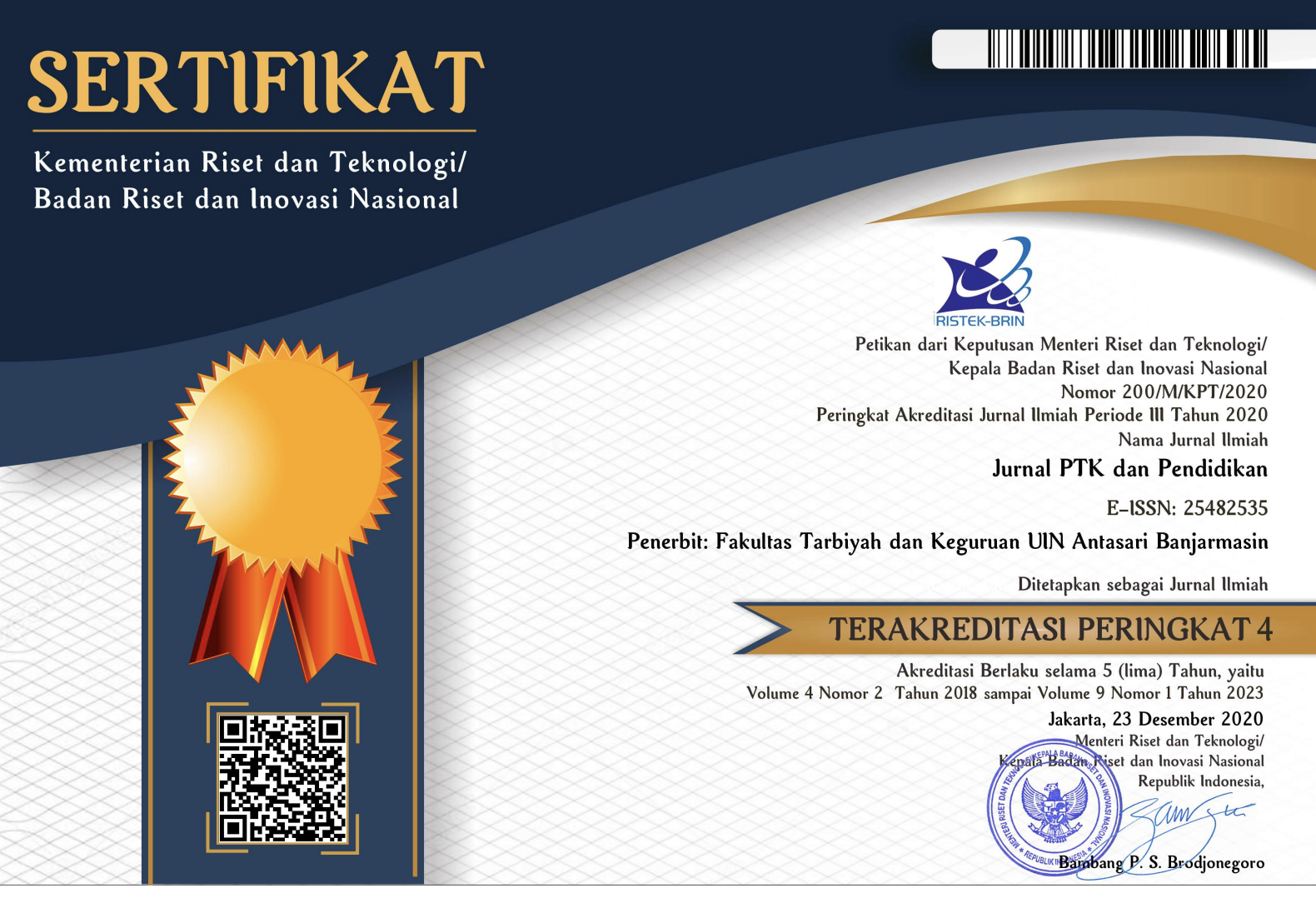INQUIRY LEARNING WITH POLYA PROPLEM SOLVING TO IMPROVE STUDENT LEARNING OUTCOMES AND ENGAGEMENT
DOI:
https://doi.org/10.18592/ptk.v9i1.9382Abstract
Abstract: This study aims to determine whether students' engagement with trigonometry material may be increased through inquiry learning by solving Polya problems. The classroom action research approach is used in this study. 36 pupils from class X, MIPA 7, SMA 1, Indramayu, served as the subjects for this study. In this study, only two cycles are allowed. The findings from cycle I revealed that not all group members could effectively communicate with one another when trying to solve a problem. Another issue with the teacher is that he has not been able to manage his time well, which results in his spending a lot of time explaining the content. s a result, learning's primary objective—which requires pupils to be more engaged and solve their own problems—is not adequately achieved. However, it appears that the specified performance indicators have been met based on the findings of teacher and student observations made during the second cycle of action.Keywords:References
Bidhayanti, Maryana Elvira. 2019. “Analisis Kesulitan Belajar Dengan Kemampuan Pemecahan Masalah.” Prosiding Seminar Nasional & Call For Papers: 333–38.
Fetra Bonita Sari, Risda Amini, Mudjiran. 2020. “Peningkatan Hasil Belajar Tema 7 Melalui Model Pembelajaran Inquiry Pada Siswa Kelas 5 SDN Cebongan 01 Salatiga Semester II Tahun 2018/2019.” Jurnal basicedu 3(2): 524–32.
Finisia, Adinda Risqi, Suroso, and Yustinus. 2018. “Penerapan Model Problem Based Learning Terintegrasi Langkah Teori Polya Untuk Meningkatkan Hasil Belajar Matematika Pada Siswa Kelas 5 SD Negeri Sidorejo Lor 05 Salatiga Semester II Tahun Pelajaran 2017/2018.” Jpkm 5(1): 73–81.
Gunadi, F, W Jannah, and M Taufan. 2021. “Hasil Belajar Trigonometri Berdasarkan Gaya Belajar Siswa.” … Nasional Matematika dan …: 139–46. https://prosiding.biounwir.ac.id/article/view/157%0Ahttps://prosiding.biounwir.ac.id/article/download/157/114.
Inganah, Siti, Annisa Nurina Vidyastuti, Retno Wahyu, and Arian Sah. 2023. “High School Students ’ Mathematical Skills in Addressing Minimum Competency Assessment Problems Using Working Backward Strategy.” 15: 999–1008.
MacDonald, Kyle, and Michael C. Frank. 2016. “When Does Passive Learning Improve the Effectiveness of Active Learning?” Proceedings of the 38th Annual Meeting of the Cognitive Science Society, CogSci 2016 (August): 2459–64.
Mahajan, Mrunal, and Manvinder Kaur Sarjit Singh. 2017. “Importance and Benefits of Learning Outcomes.” IOSR Journal of Humanities and Social Science 22(03): 65–67.
Mello, David, and Colleen A Less. 2013. “Effectiveness of Active Learning in the Arts and Sciences.” Humanities Department Faculty Publications & Research.: 45. http://scholarsarchive.jwu.edu/humanities_fachttp://scholarsarchive.jwu.edu/humanities_fac/45%0Ahttps://scholarsarchive.jwu.edu/humanities_fac/45/?utm_source=scholarsarchive.jwu.edu%2Fhumanities_fac%2F45&utm_medium=PDF&utm_campaign=PDFCoverPages.
Sanita, Risky, and Indri Anugraheni. 2020. “Meta Analisis Model Pembelajaran Inquiry Untuk Meningkatkan Hasil Belajar Siswa Sekolah Dasar.” Jurnal Kependidikan: Jurnal Hasil Penelitian dan Kajian Kepustakaan di Bidang Pendidikan, Pengajaran dan Pembelajaran 6(3): 567.
Yildirim, Denizer, and Suleyman Sadi Seferoglu. 2021. “Evaluation of the Effectiveness of Online Courses Based on the Community of Inquiry Model.” Turkish Online Journal of Distance Education 22(2): 147–63.
Downloads
Published
How to Cite
Issue
Section
License
Copyright (c) 2023 Luthfiyati Nurafifah, Farid Gunadi

This work is licensed under a Creative Commons Attribution 4.0 International License.
- The right to publication of all journal material published on the Jurnal PTK dan Pendidikan website is held by the editorial board with the author's knowledge (moral rights remain the property of the author).
- The formal legal provisions for access to digital articles of this electronic journal are subject to the terms of the Creative Commons CC BY 4.0 DEED Attribution International (CC BY) license. This license enables reusers to distribute, remix, adapt, and build upon the material in any medium or format, so long as attribution is given to the creator. The license allows for commercial use.
- Printed and electronic published manuscripts are open access for educational, research and library purposes. In addition to these objectives, the editorial board shall not be liable for violations of copyright law.






